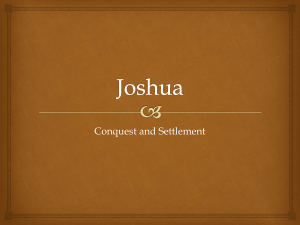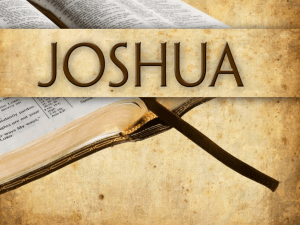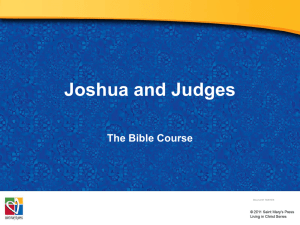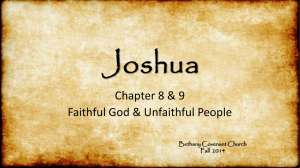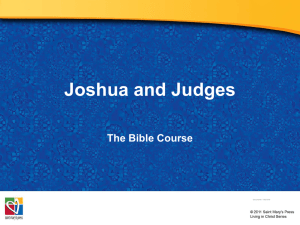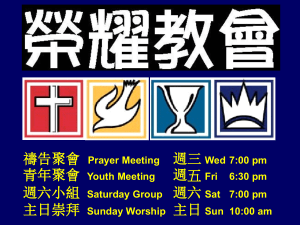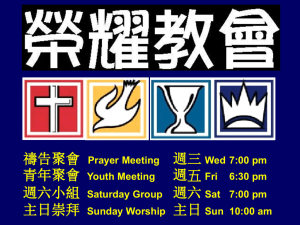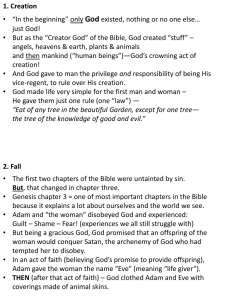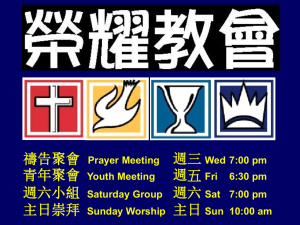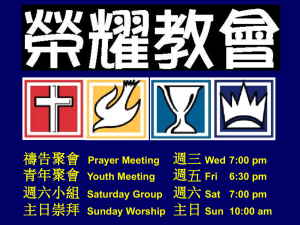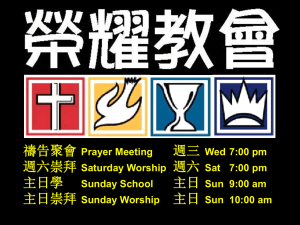Book of Joshua PowerPoint Chapter 5
advertisement
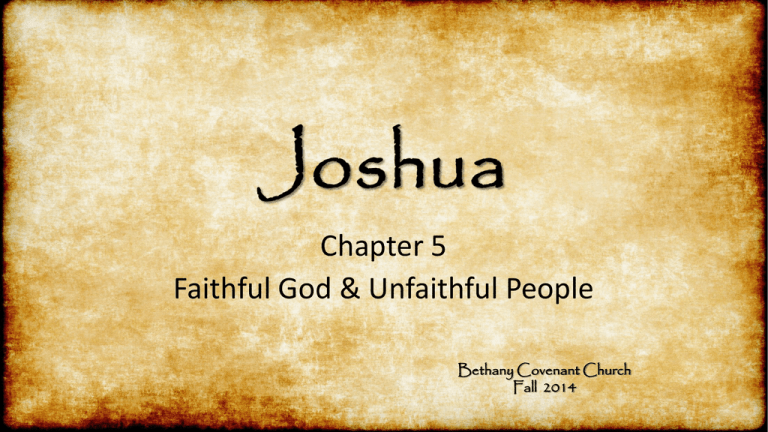
Chapter 5 Faithful God & Unfaithful People Bethany Covenant Church Fall 2014 PowerPoint Access Online www.bccmv.org/book-of-joshua Bethany Homepage/media/resources/Book of Joshua www.Microsoft.com for free PowerPoint viewer Slave, Student, Spy, Soldier, Successor, Servant In chapter 5 we see Joshua as soldier and servant. Chapter 5 Unfinished Business Before the Battle • Renewal of circumcision • Passover celebration • Appropriation of the fruit of Canaan “Now when all the Amorite kings west of the Jordan and all the Canaanite kings along the coast heard how the LORD had dried up the Jordan before the Israelites until they had crossed over, their hearts melted in fear and they no longer had the courage to face the Israelites.” (Joshua 5:1, NIV) • Israel’s conquest of Canaan began before a single arrow was shot or single spear thrown. • Faith comes by hearing and so does fear. • Notice how the fear of the kings is compared to the faith of the children of Israel in this chapter. Let’s go back one verse to look at fear “He did this so that all the peoples of the earth might know that the hand of the LORD is powerful and so that you might always fear the LORD your God.”” (Joshua 4:24, NIV) Chapter 5 Fear v. Fear of the Lord • “Humility is the fear of the LORD; its wages are riches and honor and life.” (Proverbs 22:4, NIV) • “The fear of the LORD is the beginning of knowledge, but fools despise wisdom and instruction.” (Proverbs 1:7, NIV) • “The fear of the LORD adds length to life, but the years of the wicked are cut short.” (Proverbs 10:27, NIV) “At that time the LORD said to Joshua, “Make flint knives and circumcise the Israelites again.” So Joshua made flint knives and circumcised the Israelites at Gibeath Haaraloth.” (Joshua 5:2–3, NIV) • Gibeath Haaraloth means “hill of foreskins.” • So there will be no doubt about why God is commanding this procedure it is explained in the next 3 verses. “Now this is why he did so: All those who came out of Egypt—all the men of military age—died in the wilderness on the way after leaving Egypt. All the people that came out had been circumcised, but all the people born in the wilderness during the journey from Egypt had not. The Israelites had moved about in the wilderness forty years until all the men who were of military age when they left Egypt had died, since they had not obeyed the LORD. For the LORD had sworn to them that they would not see the land he had solemnly promised their ancestors to give us, a land flowing with milk and honey.” (Joshua 5:4–6, NIV) See Numbers 14 “And the LORD spoke to Moses and to Aaron, saying, “How long shall this wicked congregation grumble against me? I have heard the grumblings of the people of Israel, which they grumble against me. Say to them, ‘As I live, declares the LORD, what you have said in my hearing I will do to you: your dead bodies shall fall in this wilderness, and of all your number, listed in the census from twenty years old and upward, who have grumbled against me, not one shall come into the land where I swore that I would make you dwell, except Caleb the son of Jephunneh and Joshua the son of Nun.” (Numbers 14:26–30, ESV) Back to Gilgal “Now this is why he did so: All those who came out of Egypt—all the men of military age—died in the wilderness on the way after leaving Egypt. All the people that came out had been circumcised, but all the people born in the wilderness during the journey from Egypt had not. The Israelites had moved about in the wilderness forty years until all the men who were of military age when they left Egypt had died, since they had not obeyed the LORD. For the LORD had sworn to them that they would not see the land he had solemnly promised their ancestors to give us, a land flowing with milk and honey.” (Joshua 5:4–6, NIV) How does Joshua know it is a land flowing with milk and honey? See Numbers 14 “Joshua son of Nun and Caleb son of Jephunneh, who were among those who had explored the land, tore their clothes and said to the entire Israelite assembly, “The land we passed through and explored is exceedingly good. If the LORD is pleased with us, he will lead us into that land, a land flowing with milk and honey, and will give it to us. Only do not rebel against the LORD. And do not be afraid of the people of the land, because we will devour them. Their protection is gone, but the LORD is with us. Do not be afraid of them.”” (Numbers 14:6–9, NIV) Back to Gilgal “So he raised up their sons in their place, and these were the ones Joshua circumcised. They were still uncircumcised because they had not been circumcised on the way.” (Joshua 5:7, NIV) • The circumcised generation disobeyed and died in the wilderness. • The uncircumcised generation were obedient and crossed the Jordan to live in the promised land. • The obedient were circumcised so they could entered into the covenant relationship with God. Genesis 17:11 “And after the whole nation had been circumcised, they remained where they were in camp until they were healed. Then the LORD said to Joshua, “Today I have rolled away the reproach of Egypt from you.” So the place has been called Gilgal to this day.” (Joshua 5:8–9, NIV) Egypt Israel asReproach aCanaanites joke and the subject If you viewed were king of the what 1. an expression ofdoing rebuke or disapproval of scornyou for be wandering dying would atand this point?in the 2. the act desert or action of reproaching during the Exodus.or disapproving <was beyond reproach> God said to Moses: of “For Pharaoh will Recall what happened 3. a cause or occasion blame, discredit, or disgrace at Shechem of the people of Israel,or ‘They are 4. onesay subjected to censure scorn. wandering in the land; the wilderness has shut them in.’” (Exodus 14:3, ESV) Shechem defiles Dinah • Jacob buys land from Hamor King of Shechem; pitches his tent and builds an alter (Genesis 33) • One day Jacob’s daughter Dinah goes to visit the women of Shechem • Dinah is defiled by the prince of Shechem; his name is Shechem • Jacob and his sons are indignant, but Shechem wants to marry Dinah • Jacob’s sons tells Hivities they must be circumcised to marry into the nation of Israel (Genesis 34) Shechem defiles Dinah “All the men who went out of the city gate agreed with Hamor and his son Shechem, and every male in the city was circumcised. Three days later, while all of them were still in pain, two of Jacob’s sons, Simeon and Levi, Dinah’s brothers, took their swords and attacked the unsuspecting city, killing every male. They put Hamor and his son Shechem to the sword and took Dinah from Shechem’s house and left.” (Genesis 34:24–26, NIV) Back to Gilgal “And after the whole nation had been circumcised, they remained where they were in camp until they were healed. Then the LORD said to Joshua, “Today I have rolled away the reproach of Egypt from you.” So the place has been called Gilgal to this day.” (Joshua 5:8–9, NIV) If you were king of the Canaanites what would you be doing at this point? Chiasmus in Joshua 5:1-9 A their hearts melted in fear because of the Israelites. (5:1) B circumcision (5:2-3) C none born in the wilderness were circumcised (5:4-5) D The Lord swore he would not let them see the land (5:6) C’ not having been circumcised on the way (5:7) B’ after circumcision (5:8) A’ I have rolled away the reproach of Egypt from you (5:9) “On the evening Notice that Passover was at Gilgal the same place No record of Passover celebration since were circumcised. days of of the fourteenth Mt. where Sinai 38they years before. NumbersThe 9:1-14 wandering are over. day of the month, while camped at Gilgal on the plains of Jericho, the Israelites celebrated the Passover.” (Joshua 5:10, NIV) No male, Israelite or foreigner to eat Passover is on a specific day in theis Hebrew Passover Exodus calendar; theunless timingcircumcised. of events had to be 12:48 perfect. “The day after the Passover, that very day, they ate some of the produce of the land: unleavened bread and roasted grain. The manna stopped the day after they ate this food from the land; there was no longer any manna for the Israelites, but that year they ate the produce of Canaan.” (Joshua 5:11–12, NIV) • Likely the people living in the promised land fled to • God had taken his people out of Egypt, now He the walled city of Jericho and left behind their had to take Egypt out of His people. grain. • Manna represented the provision of their • Psalms 23:5 “You prepare a table before me in the wandering and rebellion. presence of my enemies;” • Now they were allowed to eat the provision of • Manna was food for the unfaithful generation that their inheritance in the promise land. wandered the desert. Joshua Meets the Commander of the Lord’s Army “Then Moses said to [the Lord], “If your Presence does not go with us, do not send us up from here.” (Exodus 33:15, NIV “Now when Joshua was near Jericho, he looked up and saw a man standing in front of him with a drawn sword in his hand. Joshua went up to him and asked, “Are you for us or for our enemies?”” (Joshua 5:13, NIV) • Joshua appears to be alone and is looking at Jericho, probably to plan an attack. • In Joshua’s mind the “man” with a sword was either an Israelite or Canaanite. • The sword represents two things: • The Word of God; and • The delay in God’s judgment is over. ““Neither,” he replied, “but as commander of the army of the LORD I have now come.” Then Joshua fell facedown to the ground in reverence, and asked him, “What message does my Lord have for his servant?”” (Joshua 5:14, NIV) • “Neither” is how the “man” is saying he is not a mortal; he is not an Israelite or Canaanite. • Most commentators agree the “man” is the pre-incarnate Christ. • “Now come” refers to how God is now going to take charge of this battle, which means Joshua is no longer in charge of the situation. • Joshua the soldier then recognizes he is relieved of duty and pronounces himself a servant. “The commander of the LORD’s army replied, “Take off your sandals, for the place where you are standing is holy.” And Joshua did so.” (Joshua 5:15, NIV)was in heathen territory, • Joshua but the Lord was present and the ground was now holy. • The dirt on Joshua’s sandals represented the sin of life in the desert. ““Do not come any closer,” God said. “Take off your sandals, for the place where you are standing is holy ground.”” (Exodus 3:5, NIV) Preview of chapter 6 First two verses “Now Jericho was shut up inside and outside because of the people of Israel. None went out, and none came in. And the LORD said to Joshua, “See, I have given Jericho into your hand, with its king and mighty men of valor.” (Joshua 6:1–2, ESV) God is speaking in the past tense about a future event. Jericho was shutting out the army of Israel and by obstinacy shutting up any attempt to reconcile or seek peace. Chiasmus in Joshua 5:13-6:2 A Commander appears to Joshua with a drawn sword in his hand (5:13) B Joshua falls on his face on the ground and worships (5:14b) C Joshua asks Commander for word from the Lord (5:14c) C’ Commander gives Joshua a word from the Lord (5:15a) B’ Commander confirms that Joshua is on holy ground (5:15b) A’ Lord tells Joshua he has already given Jericho into his hand (6:2) What do we learn from chapter 5? • The sequence and timing here is significant: • Crossing the River Jordan (obedience) • Fear in the hearts of pagans in Canaan (promised in Exodus 23:27) • Circumcision (sacrifice, consecration and separation) • Healing (protection) • Reproach of Egypt removed (cleansing) • Passover (celebration NOT allowed for uncircumcised) • Manna stops & Israelites eat natural food (provision) • Commander of the Lord’s army appears (presence) • Worship • Holy ground • Heavenly warfare What do we learn from chapter 5? • Joshua was going about the business that the Lord had assigned to him—conquering Canaan—when the Lord himself showed up. • It is while we are in the course of duty that we are most likely to receive unusual blessing. • Joshua asked the Commander what message he had. • It is better to listen than to talk when in the presence of the Lord. What do we learn from chapter 5? • Joshua the soldier surrendered to the Commander and offered himself as servant. • “Not until we take the place of a servant can Jesus take His place as Lord.*” • God prepared His people before they engaged in the battle to take Jericho and the land of Canaan. • The spirit of God will never take you to a place where the grace of God cannot hold you. • God does not just call the prepared, he prepares the called. *Watchman Nee What do we learn from chapter 5? • Fear of the Lord alone is not sufficient. • Fear of the God of Israel caused the Canaanites to lose courage, but it did not cause the Canaanites to repent. • Rather than trust the Lord they trusted the walls of Jericho. • Circumcision after entering the promised land. • Involves blood and sacrifice. • It came only after the people crossed the Jordan • God would rather have your obedience than your sacrifice.* *1 Samuel 15:22, Proverbs 21:2, Hosea 6:6, Jeremiah 7:22-23 PowerPoint Access Online www.bccmv.org/book-of-joshua Bethany Homepage/media/resources/Book of Joshua www.Microsoft.com for free PowerPoint viewer Bibliography • Be Strong, Wiersbe, Warren W., Be Commentary Series. • The Bible Knowledge Commentary, Campbell, Donald K. • Opening Up Joshua, Ellsworth, Roger, Opening Up Commentary. • Matthew Henrys Commentary on the Whole Bible: Henry, Matthew. • Warren W. Wiersbe’s Expository Outlines on the Old Testament Wiersbe, Warren, W. • Commentary on the Book of Joshua, Calvin, John, and Henry Beveridge. • The Teachers Bible Commentary, Philbeck, Ben F. • The Books of History, Smith, James E., Old Testament Survey Series. • Joshua’s Spiritual Warfare, Clarke, Thomas B.

